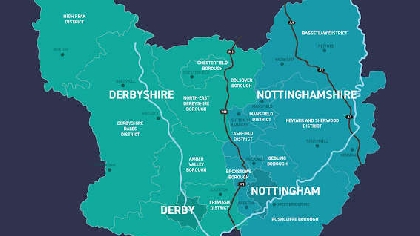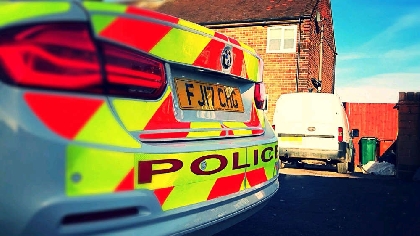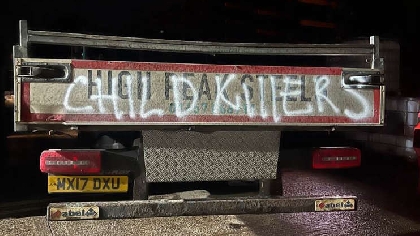
A Derbyshire council leader has called smart motorways without hard shoulders "death traps" while MPs have called for a five-year delay on their roll-out.
Cllr Barry Lewis, leader of Derbyshire County Council, said on Twitter that hard shoulders needed to be “reinstated” on all smart motorways, instead of merely pausing the roll-out of more roads of this type.
The Conservative councillor, who is also the vice chairman of the County Councils Network, said the Department for Transport had “got this wrong”.
Cllr Lewis said the MPs’ report recommending the pause of the roll-out of all-lane running smart motorways – which do not have a hard shoulder – was “welcome”.
He said: “All-Lane Smart Motorways should be ended and the hard shoulder reinstated. The DfT got this wrong and it’s time they acknowledged it. Simply put, they’re death traps.”
There is a 20-mile section of smart motorway through Derbyshire and Nottinghamshire from Junction 28 at Alfreton to Junction 31 at Aston.
This week, the Commons’ Transport Select Committee, a collection of MPs, said there was not enough safety and economic data to justify continuing with the plans to increase the number of all-lane running smart motorways and called for a five-year pause to assess their safety.
However, it also said evidence suggests reinstating hard shoulders permanently “could put more drivers and passengers at risk of death and serious injury” – because motorway capacity would be reduced.
It said: “If that traffic were diverted on to A-roads, it might result in an extra 25 deaths and 224 serious casualties per year.”
All-lane running (ALR) smart motorways are routes in which there is no hard shoulder for motorists to pull over into if they need to stop. The routes do have numerous “emergency refuges” instead.
The committee has also called for more emergency refuges on the ALR routes so that drivers do not have to travel as far in order to stop.
According to Government figures obtained by Panorama in 2020, 38 people were killed on smart motorways between 2014 and 2019.
Figures quoted by the Commons’ Transport Committee show that the number of deaths on motorways without a hard shoulder rose from five in 2017 to 15 in 201, with the size of the network being increased during that time.
The Local Democracy Reporting Service asked the Department for Transport how many deaths or injuries there have been on sections of Smart Motorway – overall and for all-lane running routes – through Derbyshire in each of the past three years.
However it said it did not hold the information.
A DfT spokesperson said: “We welcome the Transport Committee’s scrutiny and will now consider its recommendations in detail, providing a formal response in due course. This is a serious piece of work which we will engage with closely in the months ahead.
“We’re pleased that the TSC recognises that reinstating the hard shoulder on all all-lane running motorways could put more drivers and passengers at risk of death and serious injury and that we’re right to focus on upgrading their safety, as the Secretary of State committed to doing when he became Transport Secretary.
“We recognise that improvements have not always been made as quickly as they could have been in the past, but as the committee has set out, the Transport Secretary is absolutely committed to making Smart Motorways as safe as possible, including committing £500 million on upgrades and the faster rollout of Stopped Vehicle Detection.”
In July, national media published that there had been eight deaths and nearly 200 accidents on the stretch of the M1 from Junction 28 at Alfreton to Junction 35a north of Sheffield since the smart motorway went live in 2017.
The Daily Mail published parts of a letter written by the Derbyshire Police Traffic Management Unit in 2013 – released under a Freedom of Information request – which says the unit “strongly questions the need to progress this scheme (to upgrade to a smart motorway with no hard shoulder) in its current format on road safety grounds”.
It had warned the Highways Agency – Highways England’s predecessor – that coroner investigations may find the road layout contributed to deaths.
The force also noted crucial safety differences between plans for the M1 and a trial on the M42, which the roll-out was based on. These include the M1 permanently losing its “essential hard shoulder”.
In the letter, Derbyshire Police said this “conflicts totally with the need to provide a significant level of control given the obvious safety risks clearly associated with this type of road’.
The letter is said to end by warning that “the number of live incidents is likely to increase by approximately 200 per cent with a times-three fatality risk”.
Highways England said it addressed the concerns raised by Derbyshire Police. A spokesman added that recent data suggested road safety had ‘improved significantly after this scheme’s introduction’.
Read more from the Glossop Chronicle
Click here for more of the latest news
Click here to read the latest edition of the paper online
Click here to find out where you can pick up a copy of the paper


 When will we find out who will be the first-ever East Midlands mayor?
When will we find out who will be the first-ever East Midlands mayor?
 Former Derbyshire police officer jailed after suspended sentence appealed
Former Derbyshire police officer jailed after suspended sentence appealed
 Bungling pro-Palestine activists daub 'child killer' on lorries as they attack wrong firm
Bungling pro-Palestine activists daub 'child killer' on lorries as they attack wrong firm
 Hayfield chef shortlisted for ‘Pub Restaurant Chef Award’
Hayfield chef shortlisted for ‘Pub Restaurant Chef Award’



